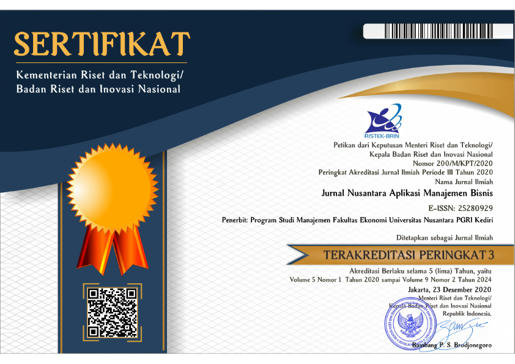Berbagi Pengetahuan Sebagai Mediator Pengaruh Persepsi Dukungan Organisasi terhadap Perilaku Inovasi UMKM Batik Jember
DOI:
https://doi.org/10.29407/nusamba.v8i1.17482Keywords:
Berbagi Pengetahuan, Persepsi Dukungan Organisasi, Perilaku Inovasi, UMKMAbstract
Research aim: To test how the role of knowledge sharing as a mediator influences perceptions of organizational support on the innovation behaviour of Batik SMEs in Jember Regency
Design/ Method/ Approach: The research method uses quantitative data by using the MSI (Successive Interval Method) data transformation method with path analysis techniques (path analysis)
Research Findings: significant influence of perceived organizational support variables on innovative behaviour, both directly and indirectly, through knowledge sharing variables. The direct effect coefficient is 0.564, while the indirect effect coefficient is 0.247. This shows that the three hypotheses prepared are acceptable because they are proven significant.
Theoretical Contribution/ Originality: The conceptual framework proposed in this model is an adaptation and synthesis of various previous research findings. Therefore this study conceptually emerges a new model in which knowledge sharing is treated as a mediating variable in mediating the effect of perceived organizational support on innovation behaviour.
Practitionel/Policy implication : For MSME managers and related agency policymakers, find out how the role of knowledge-sharing mediator variables mediates the influence of perceptions of organizational support to take appropriate actions to increase the innovative behaviour of Batik MSMEs. Through this research, two important things will be obtained. They were first able to find out how to implement knowledge sharing in Batik MSMEs, which have competency advantages to increase innovative behaviour. Second, know how to increase the perception of organizational support by implementing knowledge-sharing practices in Batik SMEs.
Research Limitations: The selection of research variables led to sampling criteria adjusted to research needs, so not all batik UMKM employees in Jember Regency became the research sample.
Keywords: Knowledge Sharing, Perceived Organizational Support, Innovative Behavior, MSMEs
Downloads
References
De Jong, Jeroen P.J. dan Ron Kemp. (2003). Determinants of Co-Workers’ Innovatve Behaviour: An Investigation into Knowledge Intensive. International Journal of Innovation Management. https://doi.org/10.1142/S1363919603000787.
Hoof, Bart Van Den dan Jan A. de Ridder. (2004). Knowledge Sharing in Context: the Influence of Organizational Commitment, Communication Climate and CMC Use on Knowledge Sharing. Journal of Knowledge Management. https://doi.org/10.1108/13673270410567675.
Dhewanto, Wawan (2015). Manajemen Inovasi untuk Usaha Kecil & Mikro. Bandung: Alfabeta.
Sabrina, Mustika Nida. (2020). Knowledge Sharing sebagai Mediasi Penentu Perilaku Inovasi Melalui Agreeableness dan Openness to Experience. Konferensi Ilmiah Mahasiswa Unissula.
Baskoro, Bimmo Dwi. (2021). Pengaruh Keadilan Organisasi Terhadap Perilaku Inovasi Pekerja Konstruksi: Peran Mediasi Berbagi Pengetahuan. Jurnal Manajemen. Vol 7 No 1. https://doi.org/10.37403/mjm.v0i0.228.
De Jong, Jeroen dan Deanne Hartog. (2010). Measuring Innovative Work Behaviour. Creativity and Innovation Management, 19 (1). https://doi.org/10.1111/j.1467-8691.2010.00547.x
Sulaiman, Muhammad. dkk. 2019. Perceived Organizational Support Role in Creating an Innovative Work Behavior. Open Access Library Journal. https://doi.org/10.4236/oalib.1105372.
Robbins, Stephen P. dan Timothy A. Judge. (2019). Perilaku Organsasi. Jakarta: Salemba Empat.
Asfar, Bilal dan Yuosre Badir. (2017). Workplace Spirituality, Perceived Organizational Support And Innovative Work Behavior : The Mediating Effects Of Person-Organization Fit. Journal of Workplace Learning, 29 (2): 95-109. https://doi.org/10.1108/JWL-11-2015-0086.
Nazir, Sajjad. dkk. (2019). How organization justice and perceived organizational support facilitate employees’ innovative behavior at work. Employee Relation : International Journal. https://doi.org/10.1108/ER-01-2017-0007.
Akhtar, Muhammad Waheed. (2019). Person-Organization Fit and Work Behavior: The Mediating Role of Perceived Organizational Support, Affective Commitment an Trust. Pakistan Journal of Commerce and Social Sciences. Vol. 13, Iss. 2, pp. 311-333.
Tewal, Bernhard. (2017). Perilaku Organisasi. Bandung: CV. Patra Media Grafindo.
Kaswan. (2014). Sikap Kerja : Dari Teori dan Implementasi sampai Bukti. Bandung: Alfabeta.
Carmeli, Abraham. (2006). Self-Leadership Skills and Innovative Behavior at Work. International Journal of Manpower, 27 (1). https://doi.org/10.1108/01437720610652853.
Messman, Gerhard & Regina H Mulder. (2012). Development of A Measurement Instrument for Innovative Work Behavior as A Dynamic and Context-Bound Construct. Human Resource Development International. https://doi.org/10.1080/13678868.2011.646894
Hoof, Bart Van Den dan Jan A. de Ridder. (2004). Knowledge Sharing in Context: the Influence of Organizational Commitment, Communication Climate and CMC Use on Knowledge Sharing. Journal of Knowledge Management. https://doi.org/10.1108/13673270410567675.
WorldBank. (2003). Sharing Knowledge to Achieve Development Goals. World Bank Operation Evaluation Department.
Hansen, Sean dan Michel Avital. (2015). Share and Share Alike: The Social and Technological Influences on Knowledge Sharing Behavior. Sprouts: Working Papers on Information Systems.
Lin, Hsui-Fen. (2007). Knowledge Sharing and Firm Innovation Capability: An Empirical Study. International Journal of Manpower. https://doi.org/10.1108/01437720710755272.
Mustika, Silvia Indah, Kusdi Rahardjo, Arik Prasetya. (2019). The Effect of Perceived Organizational Support and Innovate Work Behavior. Proceeding of the 2nd Annual Conference on Business and Public Administration (AICoBPA).
Eisenberger, R., Fasolo, P., & Davis-LaMastro, V. (1990). Perceived organizational support and employee diligence, commitment, and innovation. Journal of Applied Psychology, 75(1), 51–59. https://doi.org/10.1037/0021-9010.75.1.51
Nonaka, Ikujiro and H. Takeuchi. (1995). The knowledge-creating company: How Japanese companies create the dynamics of innovation. Oxford university press, 1995.
Kmieciak, R. (2021). Trust, knowledge sharing, and innovative work behavior: empirical evidence from Poland, European Journal of Innovation Management, Vol. 24 No. 5, pp. 1832-1859. https://doi.org/10.1108/EJIM-04-2020-0134.
Chen, C., Huang, J. and Hsiao, Y. (2010), Knowledge management and innovativeness: The role of organizational climate and structure, International Journal of Manpower, Vol. 31 No. 8, pp. 848-870. https://doi.org/10.1108/01437721011088548.
Hughes, M., Rigtering, J.P.C., Covin, J.G., Bouncken, R.B. and Kraus, S. (2018), Innovative behaviour, trust and perceived workplace performance, British Journal of Management, Vol. 29 No. 4, pp. 750-768. https://doi.org/10.1111/1467-8551.12305
Downloads
Published
Issue
Section
License
Authors who publish with this journal agree to the following terms:
- Copyright on any article is retained by the author(s).
- The author grants the journal, the right of first publication with the work simultaneously licensed under a Creative Commons Attribution License that allows others to share the work with an acknowledgment of the work’s authorship and initial publication in this journal.
- Authors are able to enter into separate, additional contractual arrangements for the non-exclusive distribution of the journal’s published version of the work (e.g., post it to an institutional repository or publish it in a book), with an acknowledgment of its initial publication in this journal.
- Authors are permitted and encouraged to post their work online (e.g., in institutional repositories or on their website) prior to and during the submission process, as it can lead to productive exchanges, as well as earlier and greater citation of published work.
- The article and any associated published material is distributed under the Creative Commons Attribution-ShareAlike 4.0 International License












